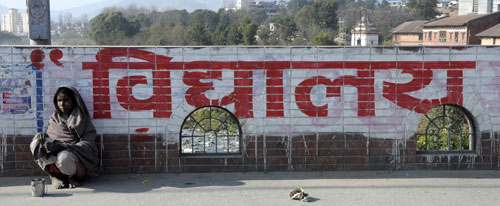 BIKRAM RAI |
After a decade-long armed conflict, Nepal is not yet at peace. The class war is giving way to a caste war, and protracted conflict over identity.
But there is another conflict that is brewing, and a harbinger was this week's attack on schools by groups affiliated to the breakaway CPN-Maoists led by Mohan Baidya. The attacks may seem to be politically motivated, but
there are deeper, and more disturbing, underlying reasons.
Nepal has a parallel education system based exclusively on accessibility and affordability. Government schools and colleges are cheap, but for the most part offer poor quality education. Private schools are more expensive, but have higher quality of education and show better results in state exams.
To talk about the unfair quality divide between public and private education may have become a futile exercise in a liberalised economy where quality comes at a price. The question really should be: why are government schools so bad?
Even so, vandalism against well-endowed private colleges should ring bells that there is something really wrong with the structure of the education system in this country.
The government and donors who support the education budget may rejoice that there are more schools in remote areas, enrolment is up, and Nepal will now meet its MDG targets for primary education, but the world has changed since those goals were set 12 years ago. To understand and cope with the complexity of social, economic and political life in the 21st century it is not enough for individuals to be literate anymore.
According to the government's 2002-2003 Economic Survey, the number of students per public secondary schools was 95.15, while the same ratio for private schools was 46.15. Similarly, the teacher-student ratio for public schools was 28, while there was approximately one teacher for every 10 students in private schools.
In 2009-2010, as the number of students in secondary public schools surged to over 500,000, the divide became even more glaring. The school-student ratio increased to 170 students and the teacher-student ratio increased to 31.42. Comparatively, the numbers stayed as low as 60.51 and 12.26 respectively for private schools.
Besides the numbers, there are unmeasured variables like infrastructure, logistics, quality of teachers and environment for education, which distinguish private education from public. The divide continues in higher education and is then forever imprinted on certificates. What is most ironical about the system is that despite of a lifelong divide in the classrooms, the students take the same tests and are marked alike in the exams. So it is not difficult to understand who has better chances of making it to the job market.
Last year thousands of young men and women, many graduates and post-graduates, applied for the 3D (dirty, difficult and dangerous) jobs in Korea, more will be applying this year. I still meet my classmate from school who was perhaps more deserving but could not complete his higher education. The state has failed in its fundamental duty of ensuring that every citizen has the freedom to choose a life of dignity.
Every year there is a shortage of text books and medicines in the remote areas, while the government increases subsidy on petrol, runs unsustainable diesel plants to light up the cities and provides various tax holidays in the name of saving jobs and encouraging business.
During one of the frequent strikes called by the parties in May, a young graduate who was vandalising a motorcycle in Pulchok told me, "I have a certificate but no job. Instead of sitting idle I am doing some politics here." You cannot expect civic behaviour from people in a country governed by uncivil priorities.
Violence should never be glorified in any form, for any end but these are times of soul searching for the more able sections of society. They must see the link between growing anarchism among the youth and the desperation they exhibit.
As long as the state cannot guarantee quality education and even out the playing field, thousands of disillusioned young minds will serve as political ammunition. And it doesn't matter which political party they belong to.
Read also:
Responsibility to protect
The uncritical mass, RUBEENA MAHATO
In a country where politicians get away with murder, one can't really blame their student prot�g�s for setting fire to school buses
No man's land, ANURAG ACHARYA
Six years after the end of the war, land continues to be the sticking point in the peace process



